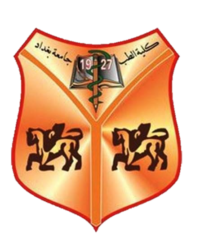Curriculum Description
This course description provides a necessary summary of the most important characteristics of the course and the expected learning outcomes for the student to achieve evidence of whether they made the most of the available learning opportunities. It must be linked to a description of the program.
General Description
| Category | Details |
|---|---|
| Name of Organization: | Baghdad College of Medicine |
| Department: | Community and Family Medicine Departments |
| Module Name: | Research Method |
| Course Pattern: | Large and Small Group Lectures, Practical Sessions, and Interactive Activities |
| Semester and Year: | 3rd Year / Semester 1 |
| Total Course Hours: | 22 theory hours, 54 practice hours on INLE website |
Goal of the Course
- To make students able to do research, learn about medical statistics and research methodology.
- To understand and apply basics of epidemiology.
Outcome of this Module
A. Cognitive and Theoretical Goals:
- A practical understanding of how to use research to interpret information in the fields of life and medical sciences.
- Realizing how to apply research methods in their practical research.
- The optimal application of research ethics, researchers, and their rights.
- Optimal use of statistical information and research methods.
B. Skills:
- Constructive criticism of research literature.
- Ability to use simple statistical programs and analyze results.
- Ability to control the type of mechanical methods used, according to the inputs, variables, and their analysis.
- Determining the optimal methods for research depending on the type of problem and its variables and identifying strengths and weaknesses in every type of research method.
Methods of Learning
- Large and Small Group Lectures, Practical Sessions, and Interactive Activities.
Methods of Assessment
- Formative Assessment (Quizzes).
- Summative Assessment (Continues Progress on INLE Website).
C. Values and Sentimental Goals:
- Learning research ethics.
- Learning rights of researchers and the sample.
D. General and Qualifying Skills (Other Skills Related to Employability and Personal Development):
- Enabling students to know valid medical researches and how to get benefited from them.
- Educating students about self-learning as an essential route for learning.
Infrastructure
Weeks: 14 weeks
Hours: 20 hours Large groups, 36 hours small group, 30 hours interactive activities on the INLE website.
Topics: Research Methodology
Course Books Required
- Biostatistics: A Foundation for Analysis in Health Sciences. By Wayne W. Daniel.
Main References (Sources)
- Statistics at Square One. Eleventh edition. M. J. Campbell, T. D. V. Swinscow, UK, John Wiley & Sons Ltd, 2009.
- Basic Epidemiology, 2nd edition. R. Bonita, R. Beaglehole, T. Kjellström. World Health Organization 2006.
Recommended Resources
Course Development Plan
- Encouraging students to present their researches in conferences.
- Development of computer labs and college INLE website to enhance research ability for the students.

